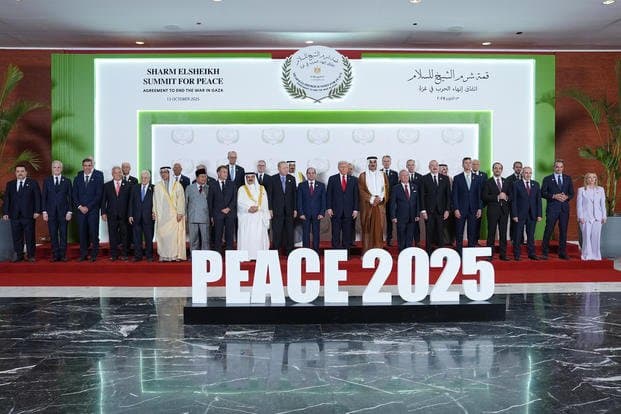We're loading the full news article for you. This includes the article content, images, author information, and related articles.
Egyptian President Abdel Fattah El-Sissi has urged global leaders to seize the "last chance" for peace in the Middle East, endorsing a two-state solution amid a summit in Sharm el-Sheikh aimed at solidifying a Gaza ceasefire and charting a path for reconstruction.

Egyptian President Abdel Fattah El-Sissi on Monday, October 13, 2025, declared that U.S. President Donald Trump's Mideast peace proposal represents the "last chance" for lasting peace in the region. Speaking at a summit of world leaders in Sharm el-Sheikh, Egypt, President El-Sissi reiterated his call for a two-state solution, emphasizing the right of Palestinians to an independent state.
The summit, co-chaired by President El-Sissi and President Trump, convened in the Red Sea resort town with the primary objective of supporting the recently achieved ceasefire in Gaza. The gathering also aimed to conclude the Israel-Hamas war and develop a long-term vision for the governance and rebuilding of the devastated Palestinian territory.
The Israeli-Palestinian conflict has deep historical roots, marked by the establishment of the state of Israel in 1948 and the subsequent displacement of Palestinians. Kenya has historically maintained diplomatic relations with both Israel and Palestine, with Palestine operating an embassy in Nairobi. Kenya officially recognised Palestinian statehood in May 1989.
Kenya's foreign policy on the conflict has generally sought a balanced approach, advocating for a two-state solution. However, its stance has at times drawn scrutiny. Following the Hamas attack on Israel on October 7, 2023, President William Ruto initially condemned the attacks and expressed solidarity with Israel. This position was later clarified by the Ministry of Foreign Affairs, which condemned terrorism while reaffirming support for a peaceful resolution and expressing concern over disproportionate retaliatory attacks by Israel.
Kenya's support for a two-state solution aligns with United Nations resolutions. The Kenyan government, through the Office of the Prime Cabinet Secretary and the Ministry of Foreign Affairs and Diaspora, officially welcomed the first phase of the ceasefire agreement on Thursday, October 9, 2025, emphasizing its role in easing human suffering.
The Trump administration's peace plan, as discussed at the summit, calls for an immediate cessation of hostilities, the return of hostages, prisoner exchanges, the demilitarization of the Gaza Strip, and the deployment of an international stabilisation force. It also envisions transitional governance by Palestinian technocrats under international supervision, large-scale reconstruction, and a conditional pathway toward acceptance of Palestinian self-determination and recognition of Palestinian statehood.
Public opinion in Kenya regarding the conflict is divided. While some Kenyans, particularly within civil society and activist groups, express strong solidarity with the Palestinian cause, drawing parallels to Africa's own struggles against colonialism, others view Israel as a crucial ally in counter-terrorism efforts. For instance, the Muslim community in Kenya has actively raised funds, such as KES 5.4 million for Udhiyah (Qurbani) in Gaza, demonstrating tangible support for Palestinians.
Egyptian Foreign Minister Badr Abdelatty stated that the success of Trump's vision for Mideast peace will depend on his continued commitment to the process, including applying pressure on the parties and deploying military forces as part of an international contingent expected to carry out peacekeeping duties.
Despite the signing of a document by President Trump, President El-Sissi, the Qatari Emir, and the Turkish President to support the ceasefire, the document's specifics were not immediately made public. Major questions remain unanswered regarding the next steps, raising the risk of a return to conflict.
While President Trump's plan holds out the possibility of a Palestinian state, it is contingent on a lengthy transition period in Gaza and reforms by the internationally recognized Palestinian Authority. Israeli Prime Minister Benjamin Netanyahu has expressed opposition to Palestinian independence.
The ceasefire agreement's first phase includes Israeli troop withdrawals from Gaza City, Rafah, Khan Younis, and the north, as well as the opening of five crossings for aid. Egypt plans to host an early recovery, reconstruction, and development conference for Gaza.
Observers will be closely watching the implementation of the ceasefire's subsequent phases, particularly regarding the demilitarization of Hamas, the establishment of a post-war government for Gaza, and the extent of Israel's withdrawal from the territory. The commitment of international partners to fund Gaza's reconstruction will also be a critical factor. Kenya's evolving diplomatic stance on the Israeli-Palestinian conflict, particularly within UN forums, will also be a point of interest for regional and international relations.
Keep the conversation in one place—threads here stay linked to the story and in the forums.
Sign in to start a discussion
Start a conversation about this story and keep it linked here.
Other hot threads
E-sports and Gaming Community in Kenya
Active 9 months ago
The Role of Technology in Modern Agriculture (AgriTech)
Active 9 months ago
Popular Recreational Activities Across Counties
Active 9 months ago
Investing in Youth Sports Development Programs
Active 9 months ago